The best Shure IEM systems feature first-class in-ear monitoring systems that allow you to hear live sound from anywhere on stage and protect you from loud performances.
These monitoring systems are designed for musicians of all levels, taking all the hassle out of them.
Since these Shure monitor systems are wireless, it’s helpful to understand how wireless systems work to get the most out of them.
Shure is constantly researching and developing wireless technology to ensure that wireless systems work properly without interruption or interference.
Is Shure in-ear monitor systems good?
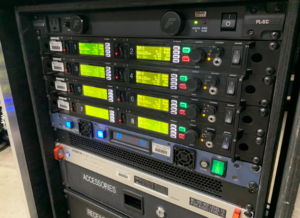
Shure has been researching and developing the highest-quality audio technology products for nearly 100 years. They provide incredibly high-quality audio to countless musicians and performers.
Shure knows that it’s important for performers to have reliable products when they’re on stage.
That’s why the same wireless technology used in Shure’s wireless microphone systems has been used in their in-ear monitor systems.
List of Best Shure IEM Systems for 2025
1. Shure PSM300 Pro IEM Monitor System
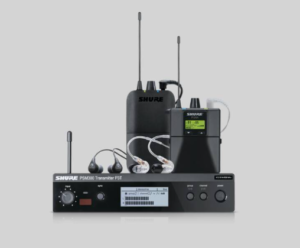
The PSM900 is Shure’s professional-level monitoring system. It’s great for anyone who wants studio-quality mixes on tour, at large events, or in live settings.
The entry-level PSM300 can be used with Shure’s P3T transmitter to switch between MixMode and stereo with a one-touch scan/sync to the P3R bodypack. Under typical conditions, the analog RF connection can cover 300 feet.
Finally, there are the SE112 earphones with a single dynamic driver and discrete design.
The Shure PSM900 can be used in MixMode. This allows you to have two personal mixes from one transmitter.
This works by using two inputs on the PSM device and setting the receiver pack to “MixMode.” You can listen to inputs 1 and 2 in both ears and use the mix control on the bodypack to change the volume between the two inputs.
This system takes the amazing audio quality and usability of the PSM300 to the next level.
It’s worth it for anyone looking to expand the capabilities of the PSM300 to take their on-stage and in-ear monitoring setup to the next level.
For example, you could use input 1 for vocals and input 2 for guitar.
You can then use the bodypack to blend the two inputs to hear more of the vocals or guitar, depending on your preference. This will not affect other performers using the mix mode.
2. Shure P10TR+425CL
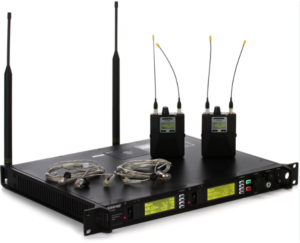
The P10TR+425CL personal monitoring system includes Shure’s state-of-the-art P10T dual-channel transmitter, delivering exceptional performance anywhere, even in crowded RF environments.
The included two P10R+ bodypack receivers feature an advanced hybrid analog/digital architecture that takes your wireless monitoring experience to the next level.
Two sets of Shure’s exceptionally sounding SE425 earphones complete the package.
Bring your wireless monitor transmitter into the 21st century with the Shure P10T. This dual-channel, state-of-the-art wireless transmitter is Ethernet networkable and wirelessly controlled via Wireless Workbench software.
Use it with the included P10R+ wireless bodypack receiver to create a complete system. The P10T easily syncs the bodypacks via the IR link.
3. Shure P9HW PSM900 Wired
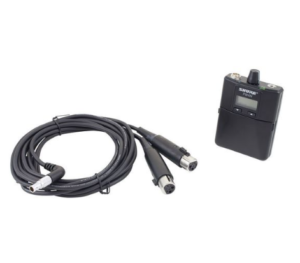
Suppose you’re a drummer or keyboard player and don’t necessarily need a wireless system but still want detailed audio quality and personal monitor mixes. In that case, Shure offers the PSM900 bodypack as a hardwired device.
Without the need for a transmitter and receiver, the P9HW delivers the same incredible audio quality as a wireless bodypack, including onboard volume and “mix mode” controls.
The bodypack can be connected to a sound source or mixer using a Y-split cable or a standard XLR cable.
4. Shure PA411 PSM Antenna Combiner
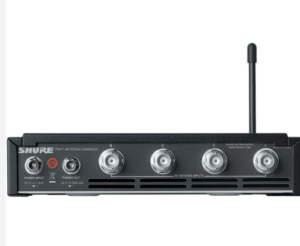
The Shure PA411 PSM Antenna Combiner 4-in 1-out (470-865 MHz) combiner distributes DC power and RF signals to up to four PSM300 transmitters.
The compact half-rack system reduces the number of antennas and power supplies required when using multiple systems.
The Shure PA411 Antenna Combiner distributes DC power and RF signals to up to four Shure PSM 300 transmitters.
The compact half-rack system significantly reduces the number of antennas and power supplies required when using multiple systems.
5. SHURE PSM1000 SYSTEM
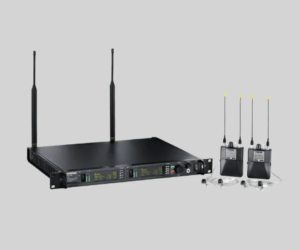
The transmitters are available as dual units only, so channels are purchased in pairs. While the PSM1000 delivers nearly the same high-quality audio you would expect from a PSM900.
With the PSM1000, you can transmit on all of the G10 bands (470-541MHz). If you have a lot of wireless units, you may want to utilize the full bandwidth available to the PSM1000.
Likewise, adding more units to your system will require networking.
FAQ
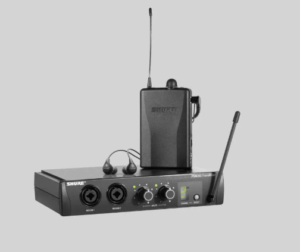
Why do I need in-ear monitors?
Stage monitors alone can be incredibly loud on stage.
Multiple band members want to hear different instruments through stage monitors, individual musicians turn up the volume to hear themselves, and vocalists may strain or blow out their voices because they think they’re not singing loud enough.
Simply put, in-ear monitors can help you perform at your best. When you can hear exactly what you want to hear at every gig, you can critique your performance and make it better the next time.
Using in-ear monitors reduces the chance of feedback from your speaker system.
Feedback occurs when sound from your speakers is picked up by a microphone and then re-emitted from the speakers, creating a loop.
Removing your stage monitors and using separate in-ear monitors eliminates this loop.
How long do Shure in-ear monitors last?
All Shure products are built to last. They undergo rigorous testing to ensure they are suitable for touring and performing.
Shure monitor systems can be rack-mounted and stored in a secure carrying case to prevent breakage. In-ear earphones are easy to replace because the cables are detachable from the earbuds.
Can in-ear monitors damage my hearing?
In-ear monitor systems can produce very high sound levels and can cause hearing damage if used for long periods of time.
These products block sound and prevent hearing loss, but they should be used responsibly. If you experience prolonged tinnitus or temporary hearing loss, seek medical attention.
Conclusion
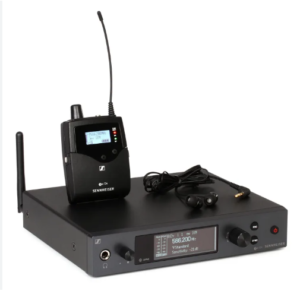
If you use the Shure in-ear monitor system, you will still need a mixer to send your instruments and vocals. This is where you can split the signal.
You can send one mix to your PA system and another mix to your monitor system. This way, you have complete control over what you want to hear.
